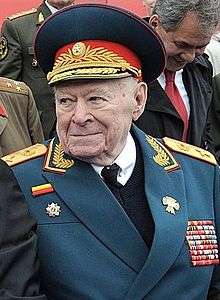Philipp Bobkov
Filipp Denisovich Bobkov (Russian: Фили́пп Дени́сович Бобко́в; December 1, 1925 – June 17, 2019) was a Russian KGB functionary, who worked as the chief of the KGB subunit responsible for repressing dissent (Fifth Main Directorate), which was responsible for suppression of internal dissent in the former Soviet Union. He was widely regarded the chief KGB ideologist or "KGB brain".[1]

Service in the Soviet secret services
Bobkov began his career in the Soviet secret services in 1945, when they were guided by Lavrentiy Beria, and survived Beria and eleven subsequent secret police chairmen. During the 1970s-1980s he "effectively became the KGB's real chairm(a)n, although officially he held the post of first deputy".[2]
Creation of front organizations
Bobkov was very instrumental in creation of KGB-controlled political organizations, such as the Anti-Zionist Committee of the Soviet Public established in 1983. He also invented Liberal Democratic Party of Russia according to Soviet Politburo member Alexander Yakovlev. However Bobkov said that he did not support the creation of this "Zubatov-style pseudo-party under KGB control that directs interests and sentiments of certain social groups".[3]
Ethnic conflicts
As described in his official biography, Bobkov was personally engaged in resolving ethnic conflicts in the Soviet Union, including Sumgait pogrom, Events in Vilnius, 1989 pogroms in the Fergana valley in Uzbekistan, Almaty revolt in 1986, January 1991 events in Latvia, and many others.
Perestroika
According to Bobkov, perestroika had been invented by him and his KGB colleagues: "We in the KGB contributed quite a bit to the process of perestroika because... without it the Soviet Union could not move ahead."[4]
Documents discovered by political scientist Robert van Voren in the Stasi archives show that in summer 1989 Bobkov came to Berlin and told Stasi Director Erich Mielke that German reunification was the work of mentally ill persons.[5]
Bobkov allegedly supervised the transfer of Communist Party money to foreign banks prior to the 1991 Soviet coup d'état attempt.[6] In October 1990, Bobkov ordered the creation of commercial firms and banks, which were managed by KGB officers and their "trusted contacts". The project was funded by KGB and Party money, "which made up almost 80 % of the amount invested in the new banks, stock exchanges, and businesses in 1990-1991", according to a testimony of Richard Palmer in US Congress about infiltration of the Western financial system.[7] Nikolay Kruchina, a high ranking CPSU official who was officially responsible for supervising the Communist Party money, fell to his death from the window of his luxury apartment in Moscow soon after the events.
Post-Soviet Russia
Bobkov officially retired in 1991 and organized a private security service in the Media Most company, which included thousands of his former KGB colleagues.[8][9] The entire archive of 5th KGB Main Directorate was taken to Media-Most.[10] This security service allegedly organized an attempted assassination of Russian oligarch Boris Berezovsky in 1994.[9]
He also worked as a personal security adviser of Russian Parliament speaker Ruslan Khasbulatov.[11]
References
- One life of Filipp Denisovich, by Evgeny Zhirnov, Kommersant, 12.05.2000.
- The State Within a State: The KGB and Its Hold on Russia - Past, Present, and Future, by Yevgenia Albats and Catherine A. Fitzpatrick. 1994. ISBN 0-374-18104-7.
- Alexander Nikolaevich Yakovlev Time of darkness, Moscow, 2003, ISBN 5-85646-097-9, page 574 (Russian: Яковлев А. Сумерки. Москва: Материк 2003 г.). The book provides an official copy of a document providing the initial LDPR funding (3 million rubles) from the CPSU money
- J. Michael Waller Secret Empire: The KGB in Russia Today., Westview Press. Boulder, CO., 1994., ISBN 0-8133-2323-1
- Trehub, Hanna (22 February 2013). "Political Madness: Dutch Sovietologist Robert van Voren speaks about Soviet repressive psychiatry and its surviving offshoots". The Ukrainian Week. Retrieved 25 February 2014.
- Transfer of Communist Party money
- STATEMENT OF RICHARD L. PALMER, PRESIDENT OF CACHET INTERNATIONAL, INC. ON THE INFILTRATION OF THE WESTERN FINANCIAL SYSTEM BY ELEMENTS OF RUSSIAN ORGANIZED CRIME BEFORE THE HOUSE COMMITTEE ON BANKING AND FINANCIAL SERVICES ON SEPTEMBER 21, 1999
- Ideologist for all times, by Felix Shemedlovsky, Russian Vedomosti
- Apolitical Gusinsky, by Andrei Grigoriev, Company, 28.03.2000
- Ideologist for all times, by Felix Shemedlovsky, Russian Vedomosti, A slightly different version
- Personal security adviser of Ruslan Hasbulatov